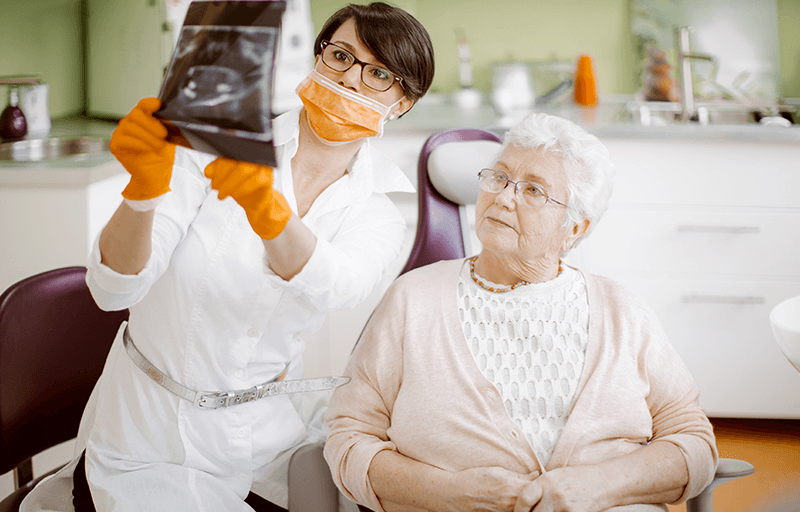Health concerns change with age, and dental care is no exception. As you approach the age of 60, the potential dental problems you face are different than when you were younger. Fortunately, just a few alternations to your dental care routine will help ensure a healthy smile during your senior years.
Here the top five dental concerns seniors should be aware of:
Increased Risk of Cavities
Have you so far enjoyed a life free (or at least relatively free) from cavities? Don’t be lulled into a false sense of security. Seniors face the second-highest risk of developing cavities out of any age group (with adolescents having the highest risk).
Chronic dry mouth increases cavity risk significantly. Over 500 common prescription medications list dry mouth as a side effect including medications for high blood pressure, cholesterol, Parkinson’s, Alzheimer’s and many more. Because seniors often have to take many medications, their chances of medication-induced dry mouth are increased.
Tell your dentist about any prescription medications you’re taking. He or she can then determine what effects those medications might have on your oral health. Depending on the severity, treatments for dry mouth can include oral spray, mouthwash, a change in medication or simply an increase in daily water consumption.
Increased Risk of Advanced Gum Disease
Seniors have an increased risk of developing periodontal disease. Time is the culprit here. Gum disease is pain-free until it reaches the advanced stage. So minor gum issues often develop subtly over decades until they become serious problems later in life.
Bacteria found in plaque causes the gums to pull away from teeth. Advanced gum disease can lead to tooth, gum and even bone loss. Daily flossing and brushing helps prevent plaque build-up. But regular dental check-ups are the most effective prevention method.
Increased Risk of Oral Cancers
Oral cancers are most commonly diagnosed at the age of 62. Early signs of gum/mouth/tongue cancers can be hard to miss because they’re painless. Watch for open sores, white patches, reddish patches or any other persistent changes in your lips, tongue or mouth. Your dentist is a valuable partner in detecting early signs of oral cancer, which is just another reason to keep up with your dental check-ups.
Darkened Teeth
Tooth discoloration occurs more frequently with age. Despite regular brushing, many seniors find their teeth begin to turn yellow, brown or even black. As we age, the dentin in our teeth begins to change composition. Plus, the outer layer of enamel wears thin over time.
Darkening teeth are usually a cosmetic issue more than a medical problem. The tooth function usually remains unaffected. Still, everyone deserves a bright, white smile at any age. In most cases, your dentist can whiten your teeth with an in-office laser treatment, at-home whitening trays or with other relatively simple whitening procedures.
Lack of Daily Dental Care
At-home care can suffer with age. Arthritis, loss of mobility, poor eyesight and other age-related ailments can make brushing and flossing difficult or even impossible. As with any other age, lack of regular dental care can quickly lead to tooth decay and other dental problems.
In these situations, loved ones and caregivers will need to help with daily dental care. Brushing and flossing should be done at least twice a day. Don’t forget about proper denture care, too. Dentures (full and partial) must be removed every night to soak in denture detergent.
Increased Dental Care Costs
Dental care costs keep many seniors from visiting the dentist as often as recommended. Often, seniors live on a relatively fixed income. Plus, because most dental insurance is provided by employers, recent retirees often have no dental insurance. Paying for dental services out-of-pocket can be prohibitively expensive. What options are available?
While many seniors use Medicare to cover some or all of their medical bills, Medicare does not cover dental care. You can purchase a dental insurance policy, but there are some restrictions. Dental insurance will have an annual coverage limit as well as limits on preexisting conditions.
Many seniors prefer using a dental discount card. Often called an affordable alternative to dental insurance, dental discount plans are membership clubs which offer instant discounts of 15% to 60% on many different dental procedures. With over 110,000 participating dentists nationwide, you’ll almost certainly be able to save at a dentist’s office near you.
Senior dental care presents a unique set of challenges. Commit to daily dental care, learn what warning signs to watch out for and always stay up-to-date with dental check-ups. A healthy, beautiful smile can be yours at any age.


